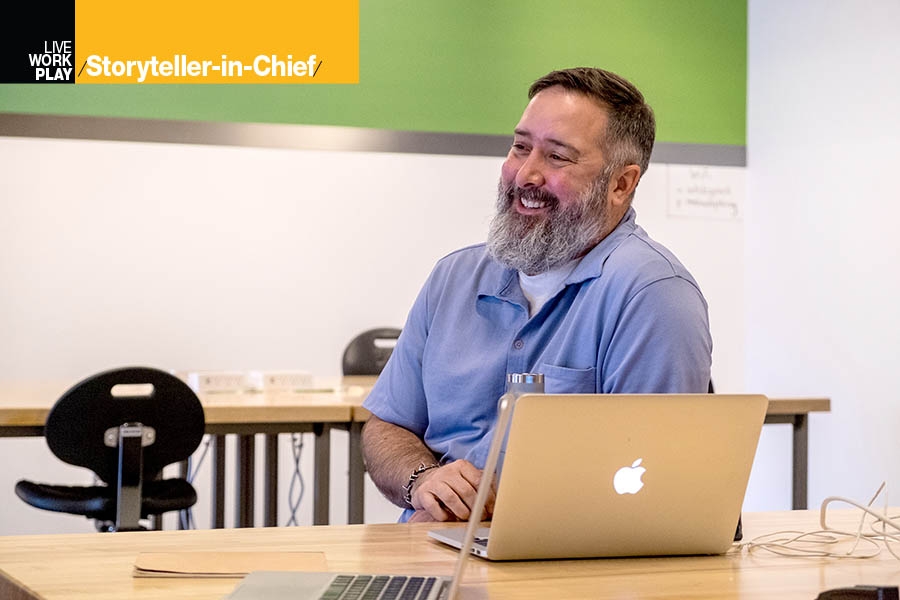Rick Turoczy writes about what makes the Portland Incubator Experiment work — and what makes it worthwhile.
It all started, quite simply, as a single experiment. And it wasn’t, honestly, meant to be anything more than that. Just a single experiment. With a high likelihood of failure.
But here we are, 12 years later, still mucking around with that same experiment. Sort of.
That simple experiment, more than a decade ago, started with two ingredients. We attempted to combine them in a way that seemed — at the time — to be unique. And when that didn’t work terribly well, we tried combining them again. In a different way. Again and again. Until we eventually stumbled upon a way that seemed to make those elements work together.
And then we broke the experiment and tried another way of combining those elements. Then we opted to try adding different ingredients, agents and environments.
That has been the story of PIE, the Portland Incubator Experiment, since its founding in an empty retail space in the Wieden+Kennedy building in the Pearl District — an area which, at the time, had just barely begun to evolve into what is now the high-rent district of Portland, Oregon’s downtown core.
Those two ingredients? One was a group of early-stage technology startups looking for somewhere to sit. And the other was a creative, risk-embracing, well-established global corporation.
What could go wrong? Better yet, what could go right?
Sometimes, it’s those seemingly opposing elements that can create the most interesting types of activity. Or at least generate the most friction and heat. And, in our experience, there are a seemingly never-ending number of ways to mix and remix those ingredients with the concepts of trust, pressure and mentorship. Or opportunities to explore adding other elements, be they ideas, concepts, startups, corporations, government, educational institutions or anything in between.
Maybe it was that intuitive — and seemingly prescient — realization that motivated us to put the word “experiment” in our name.
Truth be told, “experiment” was more of an escape clause for us. It was an excuse. For failure.
Maybe that’s because failure was nothing new for many of us. I, myself, had already spent more than a dozen years in the venture-funded startup world, a world rife with more failures than successes. And so that perceived risk was palpable to me. Others who were involved in the project had similar experiences. And the organization with whom we were collaborating, W+K, found risking failure — and “failing harder” — to be one of the key elements to the vast amount of successful work they had created over the years.
Admitting that failure was an option seemed to be the right thing to do, and, at the same time, created a sense of freedom and urgency in pursuing everything from “proven” concepts to newer, cockamamie ideas.
PIE has been a never ending series of mistakes, failures, and missteps that happen to be punctuated by some happy accidents. Which only seem to be serendipitous. Or an ongoing series of happy accidents, fostered by a series of failures that consistently motivated us to try something new and continue moving forward. And sometimes backward. A way of simply and consistently failing our way into opportunities that have enabled us to solve any number of problems. By trying, failing and retooling. Again and again. Still.
In many ways, experimenting with PIE was the easy part.
We’ve experimented with these techniques on nonprofits, open-source projects, solo founders. We’ve applied these techniques to more traditional creative pursuits. We’ve even had opportunities to test these processes on internal employee teams as a means of driving innovation throughout large corporations. Our latest pursuit involves focusing our experimental lens on the experiences of the unhoused, the housing insecure and the service providers that support those populations.
All told, we’ve worked with partners that span an incredible range of industries and disciplines: Autodesk, Business Oregon, Coca-Cola, Daimler, Fresh Consulting, Google, Intel, Nike, Prosper Portland, Puppet, Stoel Rives, Target and others. We have personally had the chance to work with startups from around the world here in Portland, Oregon. And we’ve seen our model adopted throughout the United States and, most recently, across the pond in Leicester, England.
All of that is an extremely far cry from the simplicity of putting a few entrepreneurs inside an office building. It’s a level of complexity and nuance that is light years beyond the humble beginnings of PIE. But it’s the continued experimentation that has brought us to this point. And that has our organization constantly searching for new and innovative ways to apply our programs, processes and learnings.
We never would have gotten to this point without taking the risk. Without exposing ourselves to potential failure. And without experimenting.
And that’s the kernel of something important that seems to get lost in the world of businesses on a regular basis. When exploring and continuing to learn get short shrift in favor of “sure things” and repeating what’s worked in the past, that’s not progress — and it’s not innovation.
In my mind, that sort of pursuit is more of a failure than any of our experiments that have wound up on the proverbial scrap heap over the years, because each of those failures has taught us something. And each of those failures has informed the organization we are today.
So maybe the next time you or your organization are presented with an opportunity to experiment, you should do that. Even if failure is clearly an option. Because that potential is exciting. And long lasting. And the learnings you derive from it will far outweigh the brief sting of having to admit you’ve failed.
Because in that willingness to experiment lies the value. Not what happens as a result. In the long run, it’s really just as simple as that.
Rick Turoczy (@turoczy) has been working in, on and around the Portland, Oregon, startup community for more than 25 years. He is the co-founder and general manager of PIE (Portland Incubator Experiment), an ongoing experiment exploring how established entities — like corporations, educational institutions and government — can collaborate with startup communities for mutual benefit.
To subscribe to Oregon Business, click here.







